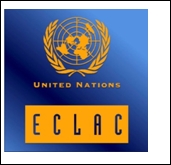
Bridging the digital divide for persons with disabilities

Policymakers and experts have identified ways in which persons with disability can enjoy the benefits of Information and Communications Technologies (ICTs). This, during a meeting hosted by ECLAC Caribbean.
While ICTs can break down barriers and ensure that everyone can participate actively in society, many people with disabilities are currently not able to use computers, access the internet or handle smartphones and other mobile technology. In the Caribbean, this is particularly worrisome, given that there are approximately 1.3 million persons with a disability of some kind and around 250,000 persons with a significant disability.
It is for this reason that ECLAC Caribbean undertook a study to research ways to bridge the digital divide that affects persons with disabilities. One of the solutions identified is the use of Universal Service Funds (USFs), which are instruments that can finance equal access to ICTs. USFs aim to increase access to telecommunication services through a levy on telecommunication providers.
In the subregion, there are currently ten USFs, and a further nine countries have legislation that would enable the establishment of a USF. Historically, USFs have faced challenges ranging from high levels of undisbursed funds to low levels of transparency and mismanagement.
Until recently, these shortcomings engendered a cautious approach to USF adoption for improving access to ICTs for persons with disabilities and other marginalised groups. However, new opportunities for increasing the effectiveness of USFs emerged today, during discussions among key stakeholders at the ECLAC Caribbean meeting.
Participants provided feedback on the findings of ECLAC’s latest study, offering perspectives on its conclusions and recommendations. The meeting identified best practices and robust suggestions for countries wishing to establish or improve an existing USF to increase access to technology for persons with disabilities.
Participating today were persons with disabilities and their organisations, representatives from universal service funds, telecommunications departments and regulatory bodies from a number of Caribbean countries as well as from regional telecommunications organisations, including the Eastern Caribbean Telecommunications Authority (ECTEL) and the Caribbean Telecommunications Union (CTU)…[+]








